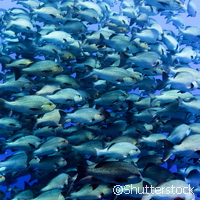Why fish populations are running out of oxygen
Scientists hope to gain a better understanding of the causes of oxygen depletion among fish populations with an EU-funded project called HYPOX. It is hoped that by continuous monitoring of coastal ecosystems around the Black Sea, the Baltic Sea and the Arctic sea, including fjords, lagoons and lakes, that fisheries can be better managed. According to Traian Gomoiu, the project team leader working for Romania's National Research and Development Institute for Marine Geology and Geoecology (GeoEcoMar), persistent hypoxia can lead to the loss of biodiversity, the degradation of the ecosystem and the collapse of fisheries. An example of the impact of hypoxia, which hit the news in 2010, was the loss of nearly two tonnes of fish found dead on the coastal line of the Romanian Black Sea. Professor Secrieru, a senior scientist at GeoEcoMar in Constanta, says: 'We wanted to carry out an in depth analysis on how the ecosystem is disrupted by the oxygen shortage and to identify the means of post-hypoxia recovery.' The scientists found through their research that oxygen gets depleted along the Romanian coast of the Black Sea close to human settlements and industrial plants, and along shipping routes. Chemical pollution combined with a large influx of freshwater brought by floods in the Danube hinders oxygen penetration to the bottom layers of the sea. Freshwater, which brings in agricultural fertilisers, can also result in algae, which consume oxygen, developing on the surface of the water. Professor Secrieru says that ecological pressures have declined in the Black Sea in the last 20 years and believes this is due to three factors: less aggressive farming methods, the closure of a seaside fertiliser factory, and the decline of industrial activity due to the economic slowdown. He says, however, 'The health of ecosystems is still precarious and it is difficult to predict further developments without a monitoring programme. It would be ideal to do this monitoring regularly, especially when the temperature is increasing or decreasing, in order to make predictions either for fundamental research or for economic assessments.' Professor Nicolae Papadopol, Scientific Director of the Museum of Natural Sciences in Constanta, believes there are means to control hypoxia: 'People in charge of environmental preservation must take urgent measures to reduce emissions, and to set up or improve water treatment plants.' Professor Verena Tunnicliffe concludes from her own seabed monitoring experience at the University of Victoria, British Columbia, Canada that, 'Monitoring is revealing a tremendous amount about ocean behavior ... We are finding that animals respond quickly and migrations are affected by the oxygen levels. Thus, commercial fisheries for animals such as shrimp and crabs can be better managed.'For more information, please visit:Hypox:http://www.hypox.net/GeoEcoMar:http://www.geoecomar.ro/website/en/index.html
Countries
Romania



